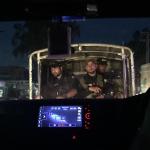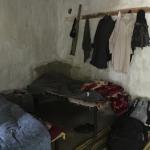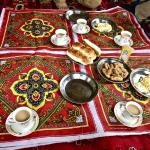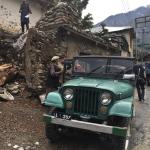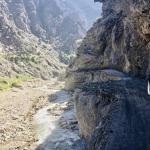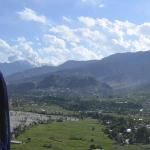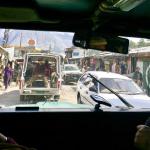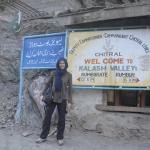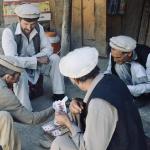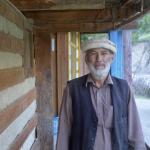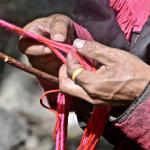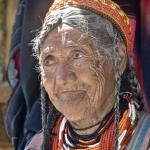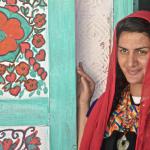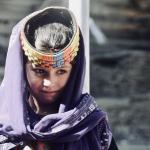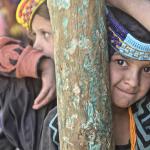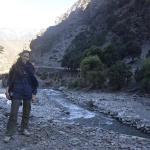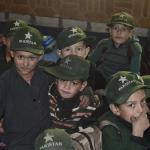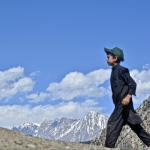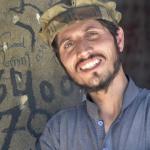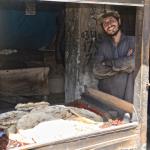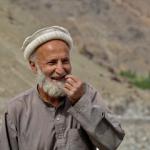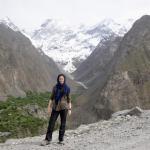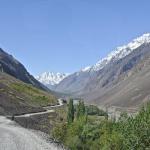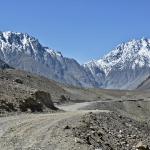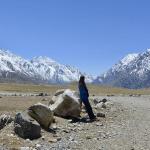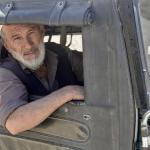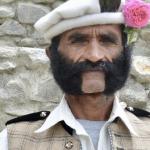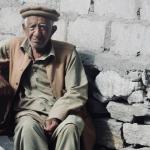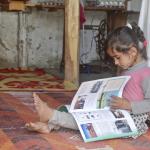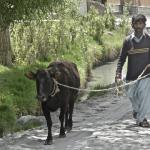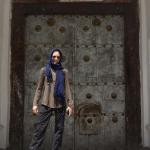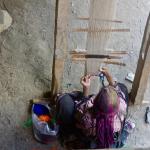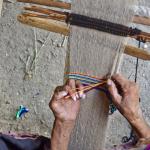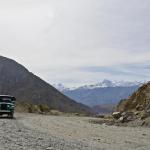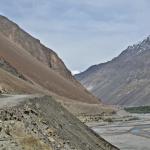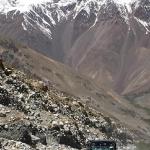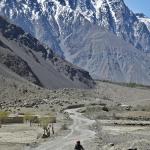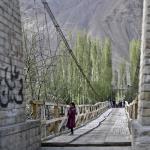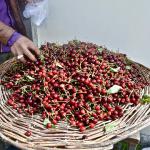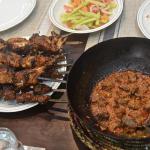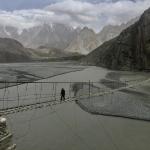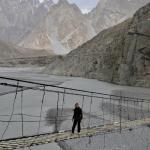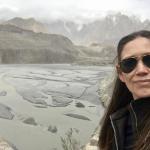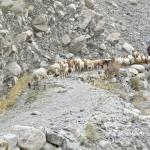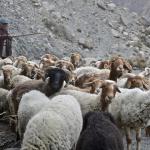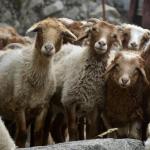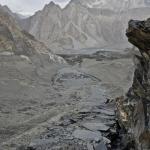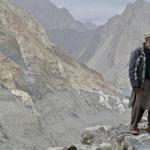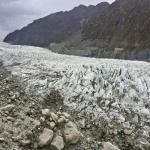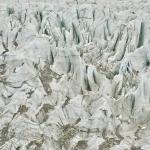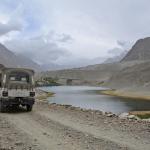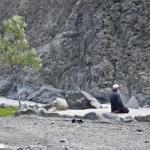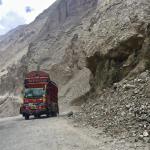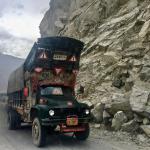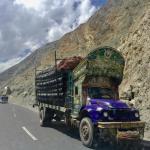© 2011 Sabrina Swenson. All Rights Reserved.
Pakistan
May, 2018
Pakistan was created in 1947 as an independent homeland for Indian Muslims. Initially a dominion, Pakistan adopted a constitution in 1956, officially becoming The Islamic Republic of Pakistan. After an ethnic civil war in 1971, East Pakistan seceded from the union to become Bangladesh. In 1973 Pakistan adopted a new constitution. Pakistan has the sixth-largest armed forces in the world and is also a nuclear power as well as a declared nuclear-weapons state, the only nation in the Muslim world to have that status. Located in South Asia, Pakistan is surrounded by Iran, Afghanistan, China and India.
My trip began with a flight into Islamabad, the capital. In order to get a visa for Pakistan, if you're headed to the North of the country to Hunza valley, a guide is mandatory. As such, I arrived in the wee hours of the morning, to find a huge herd of people waiting for their loved ones. There were only two of these people holding signs with foreigners names on them. Mine was one of them. The guide and I immediately set off to the guesthouse. As we pulled up, there was no sign that it was, indeed, a guesthouse. A man inside opened the door to a courtyard and I could see the entrance. Still, no sign that it was a guesthouse. It simply looked like someone's home. This was on purpose. Not wanting to draw any attention, we stayed in this nondescript locale. The majority of Pakistani people are lovely, however, terrorism in the country certainly exists. After a good sleep I woke the next morning and had breakfast in the common area. I met the two other travelers that had also signed up for the journey. We headed to the airport shortly afterwards for our flight. The first stop, the village of Chitral. Apparently cancellations are plentiful in and out of the remote Chitral valley as the mountainous region often has heavy fog. In fact, the area is cut off from the rest of Pakistan for three or more months of the year due to heavy snow. We got to the airport and all the way to the gate. It looked promising, alas, it was not meant to be. Heavy rains began and we sat around a while before they finally cancelled the flight. The guide had anticipated a long drive, since cancellations are so prevalent, and so, we boarded a van for the long journey. The drive was approximately 15 hours and I originally wondered why we were in an ordinary van for such a drive on a rough and challenging road. I thought a 4 x 4 would be a better option, however, I was not making transportation decisions that day.
The village of Chitral is located within the Chitral District. It is the most Northern district of Pakistan covering around 5,733 square miles. We set off on the long journey and once we reached the beginning of the Chitral District, police escorts were mandatory to comply with local police regulations. They take the safety of tourists very seriously. I originally thought we'd just have a police officer in the vehicle with us, however, after waiting a while at the police check point, upon entering the Chitral District, we instead had a truck pull up in front of us. The back of the truck was open and had three men in full gear with weapons. Our police escorts had arrived. We set off down the road with the truck in front of us and our vehicle following very closely. At this point it was dark and after driving for some time, our police escort quickly exited to the left and another police vehicle replaced it. There was no slowing down what-so-ever. These guys were good! A perfect ballet it seemed, they were so well choreographed. I realized later that the local police escorted us through their specific area only and then when we were at the end of their designated area, they pulled over to return and the next police escort from the next region would replace them. After midnight, we were closing in on the village of Chitral. We still had about 50 miles to go, however at the slow speed, due to the poor roads, our destination was still a couple of hours away. All of a sudden we stopped as a new obstacle presented itself. It had rained for a while and when we looked up to see why we had stopped, we saw the road ahead washed out. A gush of water was coming down the mountain and over our path. It was no match for the gravel road we were on. The police vehicle in front of us was, of course, a 4 X 4 and could make the crossing. Our Scooby-Doo van, however, had no chance! After assessing the options for some time, they decided to have us get in the police vehicle to cross the washed out road. At that point the driver of the van could turn around and tackle the long drive back to Islamabad and his home. We got our gear and climbed in the back of the police truck. A rev of the engine and we were across the wash-out in no time. We continued a bit further to the local police station. In the dark, sans any lights, I could barely make out the rural, shack of a police station by the light of my headlamp. The place had definitely seen better days. Sand bags appeared to be holding the place together. Since it was o-dark-hundred, we were told a driver in a proper 4 X 4 would be coming to fetch us in the morning from the village of Chitral. And so, the kind police offered us their sleeping quarters. I dropped my backpack in the small room and climbed on to a cot, still dressed in all my clothes and jacket as it was cold in the high altitude. The two guy travelers, unfortunately, got the floor to sleep. Tired from the long day, I quickly fell asleep. We woke early and much to my surprise, the police offered breakfast! We went into the next room and they unfurled a brilliant red tablecloth with beautiful print and placed in on the floor. Some fancy tea cups followed along with breakfast. Who would have ever guessed such things existed in a remote, dirty, falling down police station in rural Pakistan! They offered tea, eggs, bread and sweet desert-type biscuits. We all sat on the floor and ate. Eventually the 4 x 4 Jeeps arrived to take us the rest of the way to Chitral. We thanked the police for their very generous hospitality and headed North, this time with new police escorts.
Arriving into the village of Chitral, I had a quick shower at the hotel we were supposed to stay at the night before. We then headed off to register with the local police. At the station we had to fill out forms and we also met the police chief. A confident, friendly, outgoing man with excellent English, he happily welcomed us to Pakistan. We also checked out the town, which had a beautiful view of the mountainous region.
We eventually got packed up in our two 4 x 4 jeeps and met out drivers. Two older gentlemen, dressed in local attire, that looked quintessentially Pakistani. I thought these two were perfectly photogenic. Men of few words, they had faces that spoke volumes. We drove North with the Kalasha Valley as our first destination. Many hours later we finally arrived. Our guesthouse was beautiful. Carved out of wood, it had a stunning view of the Hindu Kush mountain range. It reminded me of Alpine homes in the Austrian or Swiss countryside. It was the home of a Kalash family; an engineer, his wife and their children. We stayed with the family in the fairly large home. The Kalash people have a unique culture and language within Pakistan. They follow a form of ancient Hinduism. They are the smallest religious and ethnic minority in the country. Their customs and traditions are contradictory to the Islamic and Pakistani culture. The people generally don't mix with the local Muslims, however, they are not hostile towards them either. They are under legal and constitutional protection of the State of Pakistan. I was shown my room and dropped off my backpack. In the common area, which was a large wooden deck, we sat and had tea. The Kalash women are dressed differently than that of other Pakistani women. They wear long black robes, often embroidered with bright colors. They also wear a head-piece and many bead necklaces around their necks. Women, young and old have their very long hair braided on both sides. Our friendly woman of the house forever had a smile on her face. She was working hard constantly. She was always cooking, sewing or busy working on something. There was no question who ran the household! We walked around the small village to get a feel for the place. Our police escort followed us, although at this point, we only had one and he was on foot. We weren't allowed to walk around without him. The beautifully colored womens robes were everywhere. They were all very friendly and let us take photos. The Kalash Valley is much more relaxed and as such, I didn't have to wear my headscarf. That night we all sat at a huge table, including our drivers and police escort. We ate the delicious meal our hostess had spent all day cooking. They also offered us some of their homemade local wine. In a country where alcohol is banned, the Kalasha Valley seems to have their own culture in every way. Made from local grapes, the drink was stiff and a bit hard to get down!
After dinner, I decided to take my shower. This consisted of a large bucket of hot water, heated over the fire by our hostess. I poured the bucket of hot water over me while standing on a wooden pallet in the bathroom. Once clean, I called it a night. It was a cold night for me. I was freezing in my small room, high in the Hindu Kush mountain range. I eventually realized, it was not only the altitude, but also because one of my windows was missing!
I woke early to the sound of the drivers just outside my room chatting away. I eventually got up and joined them. Walking onto the wood deck with the morning sun and the Hindu Kush mountain range straight in front of us, was a beautiful sight. We had the same thing most mornings for breakfast; over hard eggs and a type of oily bread. All eaten with the hand. I thought it delicious! We eventually checked out more of Rumbour, the village we were staying, including the local school. Once at the school entrance, our guide said it was ok to enter. Unannounced, we walked in. The kind teacher welcomed us to look around. The school was a beautiful wood building. Far nicer than any American school I've every seen! It was very small, six class rooms only. Every room was full of male and female students all learning together. The class curriculum, all in English! The boys all had matching dark green Pakistan hats on. After poking our heads into all the class rooms, we eventually left.
The following day we drove to the nearby Bumboret. It is the largest and most picturesque in the Kalasha Valley. After a day spent browsing the area we headed back to our beautiful guesthouse for one last night. We were up bright and early and after breakfast said goodbye to our wonderfully kind hosts.
The next part of our journey had us continuing North to Gilgit. On the way crossing through the Hindu Kush mountain range. The road continued to deteriorate as we bounced our way down the mountain road in our 40-year-old Jeeps. The mountains continued to get bigger and bigger. The journey to Gilgit would take three days. Most of which were spent in the vehicle. A rough journey, the stunning view of the surrounding mountains were the highlight. The first night we spent in the tiny village of Mastuj. We walked around the small place and with not much to do, went back to the picturesque hotel to chat.
The following day was a more difficult road as we crossed the Shandur Pass at 3,700 meters (over 12,000 feet). This day we came upon the world's highest polo ground. Every July the pass comes to life for the Shandur Pass Polo Tournament. It's one of the big festivals in Pakistan. The match is played between the teams of Chitral and Gilgit. The festival also includes folk music, folk dance and a camping village. In the afternoon we took a break at Phandur to relax by a lake and overnight before continuing our journey.
The next day we finally joined the Karakorum Highway at Gilgit and headed to Hunza Valley. After some more difficult roads we finally made it to our hotel in Karimabad. Hunza is the junction point where three mountain ranges collide. The Karakoram, Hindu Kush and the Himalayas are all visible here. Arriving late in the day, we retired early.
The first full day in Hunza Valley, we visited the ancient forts of Baltit and Altit in Karimibad. The traditional residences of the Mirs of Hunza. The following day we headed towards the village of Passu. I looked forward to Passu the entire trip, as it contained one of the reasons I came to Pakistan; the Hussaini hanging bridge. I had seen a picture of this bridge years earlier and wanted to see it in person. The bridge is extremely long as it crosses Borit Lake. Made of rickety cable and wooden planks it sways in the wind. It was overcast that day and so the entire sky seemed grey. I walked out a ways for some pictures and decided to continue to the other side, which seemed very far away. I'm not afraid of heights, but Hussaini bridge had my heart pumping. I eventually made it to the other side where I climbed up the mountain side using the fairly well-worn path the locals had made. I got some photos and headed back. This simple bridge and the stunning mountains surrounding it, was a highlight for me!
After the bridge we headed up to Passu glacier. After parking the vehicle, we set off on foot. Climbing rocks and finally onto a narrow path way, we clung to the side of the mountain. All the while making sure not to teeter too close to the edge. It was still overcast and the grey skies added to the desolate feel of the place. At one point, I saw a goat herder and his flock headed our way. On the tiny ledge we were walking on, I moved as close to the mountain as I could to allow the large herd to pass. I bent down so I was at goat eye level for some photos. When the first goats got to me, they were a bit afraid to pass. With urging from the goat herder, they were eventually persuaded to continue and I got some good photos of the animals as they passed inches in front of me. We eventually reached as close to Passu glacier as we could. I've always been fascinated by glaciers. The thickened, moving ice mass was enormous. Many photos later, we headed back to the narrow pathway wrapped tightly around the mountain and on to our waiting vehicle.
On our last day in Hunza Valley we took a walk on the high irrigation channel that's cut into the rock and runs through the village. It gave a glimpse and insights into everyday living in Hunza. The rest of the day I spent soaking in the views.
Early the following morning, I was up to watch the sunrise over these stunning mountain ranges. I climbed the hill in front of the hotel and watched as the sun arrived. The sky cleared completely and for the first time I could see the fullness of the surrounding mountains and beautiful Hunza Valley nestled in between.
We eventually left Hunza for the very long drive back to Islamabad. Since the journey is so long, we broke it up into two days. On the way, it was great to be traveling on the famed Karakorum Highway. My favorite? The pimped out trucks that are everywhere on the highway. Apparently it is a matter of national pride to have an elaborately, embellished and decked out truck in Pakistan. The more embellishment of paint, bright colors and dangling bits, the better! Some of the trucks were so elaborate, they almost could pass for art. One after another of these huge vehicles would thunder past us full up with cargo and/or goods. We spent the night in Besham before continuing South on our quest to reach Islamabad. Ramadan had started at this point and so at lunch time, since we knew there would be no restaurant open, the guide stopped to get us some fruit and snacks from a shop. We ate these inside the vehicle so as not to offend the locals who were fasting untill sun down. We continued and not far before reaching Islamabad, we drove through Abbottabad. It was in Abbottabad that Osama bin Laden was finally shot and killed by US forces. Local Pakistanis think the story just doesn't add up. I guess we'll never really know the truth. But for most, this is where they believe he parished. By the end of the day we were back in Islamabad and the heat of the plains. Our journey now complete.
I absolutely loved Pakistan. I loved all the local food and the mountains rival any in the world in terms of beauty. I was touched by the kindness and extraordinarily hospitable people. Thank you Pakistan. I will always remember you fondly!

